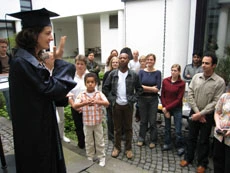Interview with Dr. Irit Eguavoen

Irit Eguavoen is a German Social Anthropologist who started her PhD study at ZEF in October 2003. She conducted her research on household water in Northern Ghana. In July 2007, she successfully defended her thesis "Now you have a new pump, you have to manage it. Household water management, water rights and institutional change in Northern Ghana" at the Institute of Ethnology, University of Cologne.
So, Dr. Eguavoen, what did you find out about household water management issues in Ghana?
Well, I've been living and working in Sirigu, a Savannah village in Northern Ghana for a period of ten months. My research covered a variety of topics concerning water at the local household level: water use, water rights, water history, water management, water allocation etc. I did a lot of surveys, interviews and observations to get an idea about the situation and the problems. Water is such an important and central issue in people's live, that it was not difficult at all to get access to information. It is subject of many conversations and people were happy to tell me what is going on. What I found striking was, that many rules and regulations stipulated by the national level don't take into account the specific local conditions. Of course, this is also not possible because there is always local diversity within a country. So it often happens that regulations are introduced officially, but people can not or refuse to implement them. Rules and measures just make no sense at times. Usually, users respond by creating appropriate institutions taking these official regulations but also their local conditions into account. Still, there may be some rather contra-productive effects. In Sirigu, for example, more water pumps were installed. But at the same time, institutional access to water became more limited and the users´ flexibility to choose their water sources got diminished.
Why did you go to ZEF to do your doctoral research in the first place?
To be honest I did not know anything about ZEF when I applied to the vacancy for the scholarship within the GLOWA Volta project, which I had found in my home institute in Berlin. My MA thesis on Nigerian vigilantism had just been submitted by this time and I started to think about what comes next. Therefore, I was rather surprised by the fast development entailing my application - request of work sample, interview etc. When I started with the ZEF doctoral program, I was still preparing my remaining final exam in Berlin. It might sound a bit funny but I really got motivated joining ZEF after the application interview, when I read the ZEF annual report in the train going back home. What attracted me most was to work in the framework of a project with some idea of applied science in the development context as well as the idea to work amidst a large group of other doctoral students.
What do you consider to be the main benefits of having done your PhD study in the framework of ZEF's doctoral program?
Exactly the two things that attracted me: ZEF and the project context provided very good logistic and scientific support while doing field research. There are other scientists and Ghanaian stakeholders interested in my results and ideas. Writing a PhD at German University Institutes can be a rather lonely business. So I am very grateful for the embedment in working groups at ZEF, such as the GLOWA Volta sub-project "Institutional Analysis" led by Dr. Wolfram Laube and the ZEF research group "Natural Resources Social Dynamics" under the leadership of Dr. Peter Mollinga. Via this research group and the frequent review of other colleagues' work, my knowledge on other regions, problems, natural resources and theoretical approaches has widened enormously. This has helped me with my own work and motivated me a lot. What I enjoyed most at ZEF was this exchange of ideas, in fact. I think this forum function is the best that ZEF offers to doctoral candidates.
And what are the "fresh" young Doctor's plans for the future?
I want to remain in science. From my training at ZEF I know that I want to continue doing applied research or to work on topics which are of crucial relevance for the people the research is about. But I also would like to go more into lecturing and tutoring, because I enjoy doing that and looking at development, contributing to the development of human capacity is one of the most rewarding tasks to perform.

